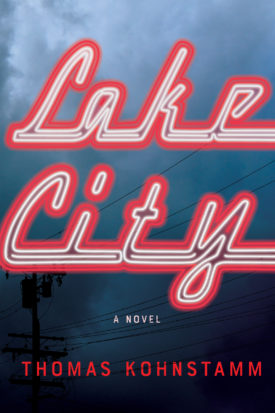The Hamlet of Lake City

Last week, I interviewed author Thomas Kohnstamm about his excellent debut novel Lake City onstage at Elliott Bay Book Company. It was a packed room, and the mood was warm and loving. Kohnstamm would stop mid-answer to say hello to an old friend who he spotted in the audience, or point out someone he went to middle school with. In sports terms, it was a hometown crowd. What follows is an edited and abbreviated version of our discussion.
The book is set in Seattle in 2001. Why did you pick that time, and how much research did you have to do for that setting? 2001 is a long time ago now.
Our protagonist, Lane, is dealing with the aftermath of a breakup, which is not just an emotional kickdown, but a backsliding in class, basically. That experience, the emotional starting point of the novel, was based on an experience I had in my own life. It's not exactly as it played out in the book, but I did have that experience, and I did base the book off of different details of my horrible winter break of 2001, in the aftermath of 9/11. Everything was messed up. Everything was going to shit.
And there were details that I researched from there — figuring out what cell phones were like in 2001, for example, which was kind of a strategic decision. If the book had happened in 2019, Lane would have an unlimited data plan and he'd be able to reconnect with things. But I wanted him to be totally isolated and frantic.
I also thought 2001 was an interesting point in the trajectory of the development of Seattle, a midpoint between 1986 when Microsoft went public and where we are now. Now we've become this very well-heeled city and Amazon has come to fruition and they're hiring 300 people a week who make six figures. I thought 2001 was when things really started to blow up.
I think some of the reviews I've read misread this book as a glorification of Lane, that sort of aimless angry young white man. But in fact, Lane is kind of the butt of the joke a lot of the time, isn't he?
The joke was primarily on Lane, I'd like to think. And I think that there are some people who have misunderstood — I think Lane is the clown at the middle of all of it, and Lane knows the least of anyone and everyone in the book. Lane comes into everything thinking he has it all figured out, and everybody surprises him in the long run. They're much smarter than he thinks.
I think what I was trying to wrestle with in the book is what's the downside of ambition? What's the dark side of ambition? What are the costs? If you're trying to pull yourself up, make something different and better of yourself, what is the cost in that process?
What is it about ambition, or lack thereof, that makes such a compelling story, from Hamlet to Lane to the story of Seattle? And what's your relationship to ambition?
Well, you know, ambition is framed as this word that we're told is good and positive. But what does ambition really mean? Ambition means potentially climbing over other people to gain more. There have been a lot of points in history that ambition was seen as a sort of naughty attribute, or something that you shouldn't be proud of, and gaining great wealth was something that you should be ashamed of. But we're living in a time when there's a cost to everything.
As for me, I'm an ambitious person. I think that anybody who writes a novel is obviously not a normal human being. I spent seven years writing this in my basement after my wife and children had gone to bed when I could've been watching TV or sleeping or socializing with friends or relaxing. It's got to be a compulsion at some level, and there's a cost to that, whether it's a financial cost or a relationship cost. So maybe in a lot of this, I'm exploring the path of the writer too.